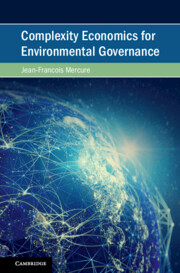Book contents
- Frontmatter
- Contents
- Figures
- Tables
- Preface
- Acknowledgements
- Part I The State of Knowledge and its use in Environmental Economics
- Part II A Positive Theory for Complexity Economics
- Part III Applied Complexity Economics for Environmental Governance
- 12 Risk-Opportunity Analysis for Transformative Policy Design and Appraisal
- 13 A Science–Policy Interface for the Energy–Water–Food Nexus
- 14 Technology Dynamics in a Rapid Low-Carbon Transition
- 15 Macroeconomics and Structural Change in a Rapid Low-Carbon Transition
- 16 Conclusions and Outlook
- References
- Index
16 - Conclusions and Outlook
from Part III - Applied Complexity Economics for Environmental Governance
Published online by Cambridge University Press: 03 November 2022
- Frontmatter
- Contents
- Figures
- Tables
- Preface
- Acknowledgements
- Part I The State of Knowledge and its use in Environmental Economics
- Part II A Positive Theory for Complexity Economics
- Part III Applied Complexity Economics for Environmental Governance
- 12 Risk-Opportunity Analysis for Transformative Policy Design and Appraisal
- 13 A Science–Policy Interface for the Energy–Water–Food Nexus
- 14 Technology Dynamics in a Rapid Low-Carbon Transition
- 15 Macroeconomics and Structural Change in a Rapid Low-Carbon Transition
- 16 Conclusions and Outlook
- References
- Index
Summary
This chapter concludes the book by offering a vision of the next problems of environmental governance to solve as the world undertakes a low-carbon transition. The first key point is that the sustainability transition is already underway. The second is that it will not lead to lower economic growth, but rather, faster economic growth with a weakening of economic, financial and political stability globally. These important findings should underpin a radically different policy conversation than has happened up to now, looking to understand risks and opportunities rather than estimating costs and benefits. It is quite clear that the low-carbon transition will leave some people behind through structural change in the economy, creating new inequalities or reinforcing existing ones. Economic agents are classified here into two overarching supergroups, the ‘optimists’, forward-looking agents who operate in the new economic paradigm with rising expectations, and the ‘sceptics’, who look towards the past and are becoming trapped in the old technological paradigm, with depressed expectations. Institutions of governance and policy advocates will have to move on from persuading the world to adopt climate policy and go towards developing effective and equitable governance modes for the sustainability transition that has been put in motion.
- Type
- Chapter
- Information
- Complexity Economics for Environmental Governance , pp. 403 - 410Publisher: Cambridge University PressPrint publication year: 2022



